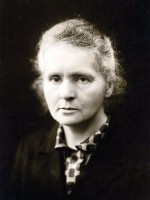Madame Curie was born in Poland in 1867 (151 years ago!) and later moved to France to further her studies. While in France, she met a professor in the School of Physics, Pierre. She married him in 1895. The pair worked together in what was described by many scientists at the time as a "shack." It was in this shack that the couple discovered Polonium (Po) and Radium (Ra). At the time, no one was aware of how dangerous these elements are, so the couple often carried samples around with them in their pockets. Pierre Curie was said to carry around a vile of Radium strapped to his arm because he was curious about how it seemed to burn him without causing any pain. Marie left a sample of the material by her bed and used it as a nightlight.
When the Curie's originally discovered Radium in 1898, they refused to patent it and instead spread the word to other scientists. Factories sprouted up everywhere and Radium eventually made its way into just about everything from chocolate to cosmetics. Once the dangers of Radium were discovered, it was removed from these products, of course.
In 1903 the couple was nominated for a Nobel Prize, but due to the sexist nature of society at the time, Mme. Curie's name was left off the original submission. After a letter from Gosta Mittage-Leffler, a sympathetic member of the nominating committee, was sent to Pierre, the omission was corrected. Later that year, Marie Curie became the first woman to win a Nobel Prize!
After Pierre's tragic death in 1906, Mme. Curie became the first woman to be the Professor of General Physics at the Faculty of Sciences in Paris. Her life was full of firsts and breaking barriers for the female scientists to come.
In 1911, Mme. Curie received her second Nobel Prize, this time in chemistry, for the work she did in radioactivity. This was also the year she was rejected from the French Academy of Sciences because of her immigrant roots and her gender.
The eldest of the Curie children, Irene, later followed in her parent's footsteps and enrolled at the Faculty of Sciences. Before she could finish her studies, World War II commenced, and she joined her mother as a nurse using X-ray machines to help treat wounded soldiers. Irene later won a Nobel Prize along with her husband, Frederic Joliot, in chemistry for their work in creating new radioactive materials. Marie Curie was excited to see her daughter nominated but unfortunately died in 1934 before she could watch Irene accept the award.
Madame Curie's work has inspired female scientists for decades and will continue to do so for years to come. The way she pushed society to improve, while continuing her pursuit of knowledge and the advancement of science, was absolutely astonishing. I can only hope to be half the scientist she was someday.
Happy birthday, Marie Curie, and thank you! May your legend live on forever.
 The start of Marie Curie's story isn't like most of the other scientists that had made a name for themselves throughout history, mostly because she was a grown woman by the start of the 20th century. But she was the first woman to do a lot of things, including getting a Ph.D. from a university in France, and winning a Nobel Prize. She was also the first person ever to win a Nobel Prize in two different fields of science. To say she pushed the societal and scientific boundaries of her era is an understatement.
The start of Marie Curie's story isn't like most of the other scientists that had made a name for themselves throughout history, mostly because she was a grown woman by the start of the 20th century. But she was the first woman to do a lot of things, including getting a Ph.D. from a university in France, and winning a Nobel Prize. She was also the first person ever to win a Nobel Prize in two different fields of science. To say she pushed the societal and scientific boundaries of her era is an understatement.




